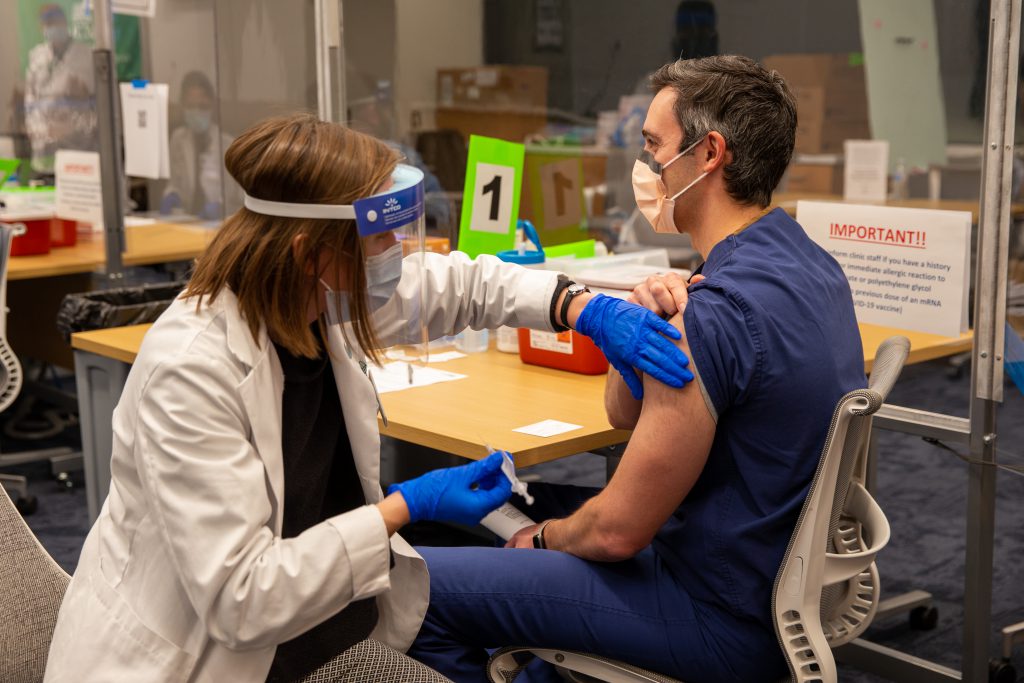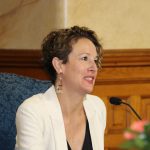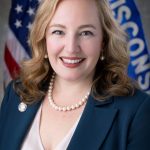Giving Schools a Shot in the Arm
Vaccinating teachers would enable schools to reopen. But it’s not that simple.

Dr. Ben Weston receives second dose of COVID-19 vaccine. File photo courtesy of the Medical College of Wisconsin.
Janesville Public Schools closed for classes on Friday, Jan. 22, in order for school employees to receive the COVID-19 vaccine. These vaccinations happened despite the fact that educators were not yet scheduled to receive shots according to the state’s timetable. When the vaccinations were announced, Gov. Tony Evers stated in his press briefing that he would not stop the vaccinations because it would cause more disruption than was necessary.
On Thursday, January 21, Milwaukee Mayor Tom Barrett told a local television station that, if the Milwaukee school district could set a date when they can get their teachers back in the classroom, “we will do everything possible to make sure they got vaccinated.”
Miller and Milwaukee School Superintendent Keith Posley both say the mayor spoke to the media without first discussing the matter with people working in the school system. The question of when teachers are vaccinated, and whether they should return to in-person teaching before getting the shots, is one of several volatile debates taking place around the nation.
Chicago teachers were directed to go back to the classroom on Monday, January 25, but the teachers voted overwhelmingly to defy the order, demanding to be vaccinated before returning to the classroom. Vaccinations for teachers has become a major issue in negotiations with the teachers’ union.
School districts across the county and in Wisconsin are pushing to reopen, sometimes before vaccinations take place, as are many state legislative Republicans.
After Elbert County schools in Georgia had its teachers vaccinated outside of the Phase 1A+, the state’s public health department suspended the local medical center from distributing COVID vaccines for six months. It is unlikely that Wisconsin would do the same to Milwaukee if Barrett makes good on his promise to provide vaccines to educators outside of the established vaccination window.
Requiring educators to get vaccinated
Miller believes that vaccinating teachers alone is not sufficient. He points out that educational assistants, secretaries, bus drivers and other school personnel come into regular contact with students. And school food service workers, Miller adds, are risking their lives every day to provide lunches to Milwaukee students.
The Wisconsin Department of Public Instruction has ordered Milwaukee schools to open for special education students by Feb. 8 or face cuts in state funding. The school board pushed back at a Jan. 26 meeting, with members saying they would attempt to meet that goal but would not be bullied into opening if they determined schools were not safe. They are consulting with the city attorney.
Recent updates from the state suggest that most teachers might not receive vaccinations for another month, but the timeline continues to change from day to day. Milwaukee may try to get vaccinations for special education educators to meet the Feb. 8 deadline, but nothing has been promised as of yet.
Even when the vaccine is available for all school employees, that doesn’t mean that everyone will be willing to get the shots. Assembly Minority Leader Gordon Hintz (D-Oshkosh) worries about vaccine hesitancy in school employees. “My fears are that we could hit 60% by June, but there will be the 40% who are reluctant.”
Hintz has introduced a number of bills in the last few years to increase vaccinations in Wisconsin. “If we can’t get to 85, 90% [getting the vaccine], it isn’t going to be as effective,” he says.
When it comes to having school districts actually requiring school employees to be vaccinated as a condition of employment, “the law is very clear … you can impose a mandatory vaccination requirement” says Andrew Phillips with the law firm of von Briesen and Roper. When it comes to the specific COVID vaccines, “even though it is in emergency authorization, you can still mandate it,” but that doesn’t mean it will not be challenged in court. Currently the Wisconsin Legislature is voting on a bill that would forbid employers from mandating a vaccine.
The Wisconsin Education Association Council (WEAC), the state teachers’ union, supports getting educators vaccinated as soon as possible. However, the union opposes COVID vaccinations as a condition of employment.
Phillips recommends a “carrot approach” to getting employees vaccinated. “We incorporate vaccinations within our wellness program, providing some benefits for getting the vaccination.” A school system might “try to limit contact between students and staff and other individuals who refuse vaccinations.”
It is unlikely that many Wisconsin school boards would want to consider vaccination mandates, especially in areas of the state with conservative populations that even balk at mask wearing and social distancing. But they may take a second look if their infection rates continue to rise, classrooms become harder to staff and insurance companies start asking questions and start raising rates.
On the other hand, Phillips points to an opposite concern: “If the employer mandates vaccination, and the employee gets really, really sick as a result, what kind of liability concerns are there?”
Requiring students to get vaccinated
Dr. Anthony Fauci, chief medical advisor to President Joe Biden, is now more optimistic. He projects that we might be able to vaccinate children under the age of 16 by late spring or early summer.
Michael J. Chusid, who recently retired as a specialist in pediatric infectious disease at Children’s Hospital of Wisconsin, says parents may be reluctant to enroll children in research studies. “Trials are underway in kids with these vaccines, but going slow because of difficulty in recruiting child volunteers,” he writes in an email. “Because COVID causes so little severe disease in most kids, parents are apparently not enthusiastic about enrolling their kids in studies of a largely untested vaccine.”
The real concern to advocates of vaccinations is the large loopholes for parents to opt out for health, religious and personal conviction reasons. Wisconsin is one of a handful of states that allows all three exemptions. Hintz has tried to get the Legislature to limit these opt-out provisions.
The largest group opting out in Wisconsin are for personal convictions. They may not trust vaccinations. They may be making a political statement. They may cling to the misguided conspiracy theories that COVID is a hoax, or that the government wants to inject everyone with a microscopic tracking device. All parents have to do is sign a paper.
Hintz points out that one of the Wisconsin counties with the lowest vaccination rate is Vernon because of the Amish community’s religious beliefs. But liberal Dane county is not immune, says Hintz, because some of those parents believe vaccinations cause autism.
Complicating the picture
Before long, Wisconsin could face a situation where the vast majority of educators are vaccinated but most students are not. While many younger students are asymptomatic, this could lead to transmission to educators and families.
New studies are suggesting that the more easily transmittable strains of COVID coming out of the U.K. and South Africa might endanger plans to reopen schools.
An alarming new study from Great Britain suggests that children may spread the virus at a higher rate than adults, finding that children under age 16 are twice as likely, and ages 12 to 16 are seven times as likely to spread the virus than those over the age of 16 and adults.
If schools are open and do not maintain preventive measures such as masking, social distancing and improving ventilation systems, classrooms may become petri dishes where the virus will be passed around among students and staff members resulting in COVID being spread to other family members and the larger community.
A handful of individuals cannot be vaccinated for medical reasons, making vaccination more critical for those who are able to do so. Hintz says this is why “we need all the other children to be vaccinated because their lives” are at stake.
The reaction is often associated with anaphylaxis, which appears to be 10 times greater with COVID vaccinations than the regular flu shots. This is one reason why those receiving COVID vaccinations should wait 15-30 minutes before leaving the vaccination site.
Most schools will likely be open for in-person education by next fall, if not sooner. But if a large segment of the public refuses vaccinations, or to wear masks and social distance, allowing new mutations to spread, schools and the general community may not make that goal.
Reprinted with permission of Wisconsin Examiner.
More about the Coronavirus Pandemic
- Governors Tony Evers, JB Pritzker, Tim Walz, and Gretchen Whitmer Issue a Joint Statement Concerning Reports that Donald Trump Gave Russian Dictator Putin American COVID-19 Supplies - Gov. Tony Evers - Oct 11th, 2024
- MHD Release: Milwaukee Health Department Launches COVID-19 Wastewater Testing Dashboard - City of Milwaukee Health Department - Jan 23rd, 2024
- Milwaukee County Announces New Policies Related to COVID-19 Pandemic - David Crowley - May 9th, 2023
- DHS Details End of Emergency COVID-19 Response - Wisconsin Department of Health Services - Apr 26th, 2023
- Milwaukee Health Department Announces Upcoming Changes to COVID-19 Services - City of Milwaukee Health Department - Mar 17th, 2023
- Fitzgerald Applauds Passage of COVID-19 Origin Act - U.S. Rep. Scott Fitzgerald - Mar 10th, 2023
- DHS Expands Free COVID-19 Testing Program - Wisconsin Department of Health Services - Feb 10th, 2023
- MKE County: COVID-19 Hospitalizations Rising - Graham Kilmer - Jan 16th, 2023
- Not Enough Getting Bivalent Booster Shots, State Health Officials Warn - Gaby Vinick - Dec 26th, 2022
- Nearly All Wisconsinites Age 6 Months and Older Now Eligible for Updated COVID-19 Vaccine - Wisconsin Department of Health Services - Dec 15th, 2022
Read more about Coronavirus Pandemic here





















